
Think Again: Are Education Programs for High Achievers Inherently Inequitable?
This brief challenges the notion that marginalized students of high ability are harmed by advanced education, with implications for better screening measures and expansion of programs.
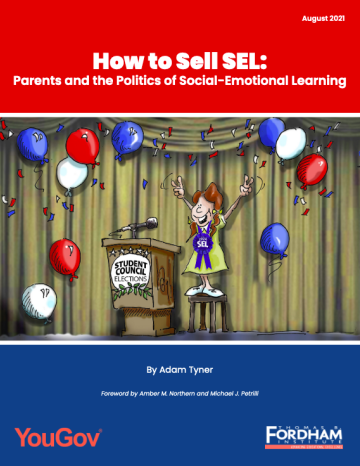
How to Sell SEL: Parents and the Politics of Social-Emotional Learning
This report examines parents’ opinions on SEL and pitfalls in communicating about it. It finds overwhelming support for the essence of SEL and its place in schools, but differences by political party and challenges in getting the terminology right.
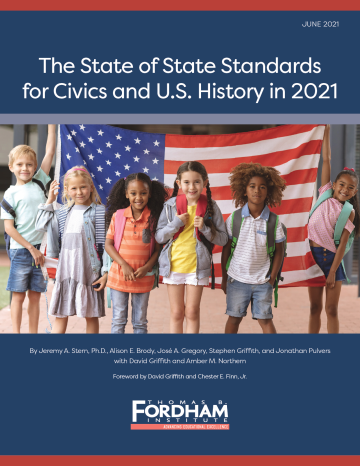
The State of State Standards for Civics and U.S. History in 2021
Is America a racist country? Or the greatest nation on earth? Such a divisive question leaves little room for the complexity, richness, and nuance of our country’s past and present. But it’s the sort of question that often seems to get asked in today’s polarized environment. Small wonder, then, that the tattered condition of civics and U.S. history education constitutes a national crisis.
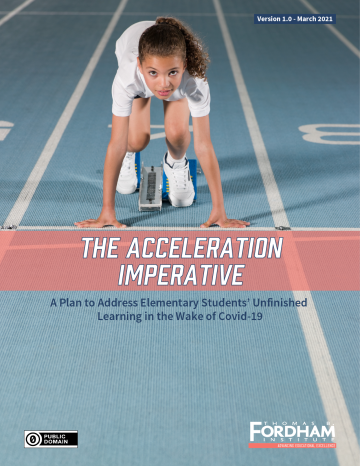
The Acceleration Imperative: A Plan to Address Elementary Students’ Unfinished Learning in the Wake of Covid-19
In school districts and charter school networks nationwide, instructional leaders are developing plans to address the enormous challenges faced by their students, families, teachers, and staff over the past year. To help kick-start their planning process, we are proud to present The Acceleration Imperative, an open-source, evidence-based document created with input from dozens of current and former chief academic officers, scholars, and others with deep expertise and experience in high-performing, high-poverty elementary schools.
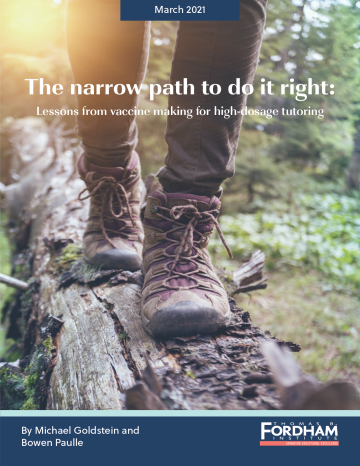
The narrow path to do it right: Lessons from vaccine making for high-dosage tutoring
High-dosage tutoring is receiving a lot of buzz as a promising tool to address learning loss in the wake of the Covid-19 pandemic. But unlike vaccines, successful tutoring programs are challenging to scale with fidelity. In this paper, long-time educators Michael Goldstein and Bowen Paulle explain how leaders can smartly scale promising tutoring programs that can boost student outcomes.
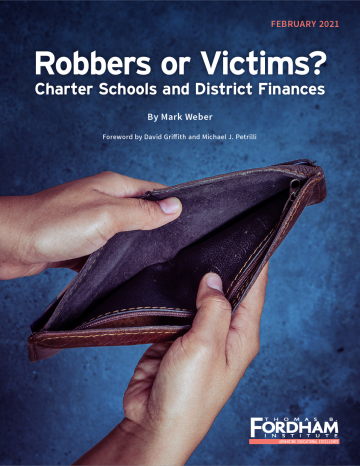
Robbers or Victims? Charter Schools and District Finances
Opponents of charters contend that they drain district coffers, while proponents argue that it is charters that are denied essential funding. Yet too often, the claims made by both sides of this debate have been based on assumptions rather than hard evidence.
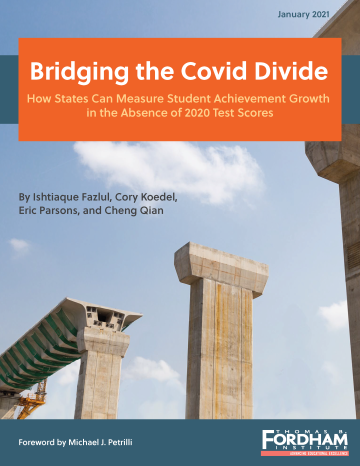
Bridging the Covid Divide: How States Can Measure Student Achievement Growth in the Absence of 2020 Test Scores
When the Covid-19 pandemic hit the U.S. last spring, schools nationwide shut their doors and states cancelled annual standardized tests. Now federal and state policymakers are debating whether to cancel testing again in 2021. One factor they should consider is whether a two-year gap in testing will make it impossible to measure student-level achievement growth during this historic period.
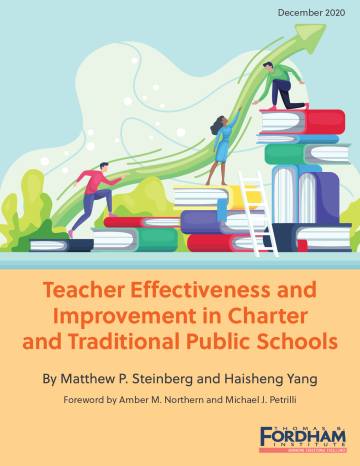
Teacher Effectiveness and Improvement in Charter and Traditional Public Schools
Study after study has found that new teachers tend to be less effective than educators with more experience. But despite having more junior staff, charter networks (referred to as CMOs) often outperform their district peers. So what’s their secret? To find out, this study explores how teacher effectiveness varies and evolves across traditional and charter public schools, as well as within the sector’s CMOs and standalone schools.
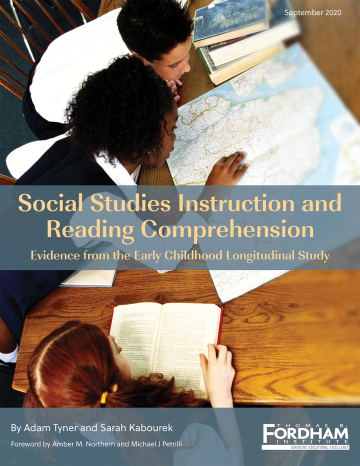
Social Studies Instruction and Reading Comprehension: Evidence from the Early Childhood Longitudinal Study
Even as phonics battles rage in the realm of primary reading and with two-thirds of American fourth and eighth graders failing to read proficiently, another tussle has been with us for ages regarding how best to develop the vital elements of reading ability that go beyond decoding skills and phonemic awareness.
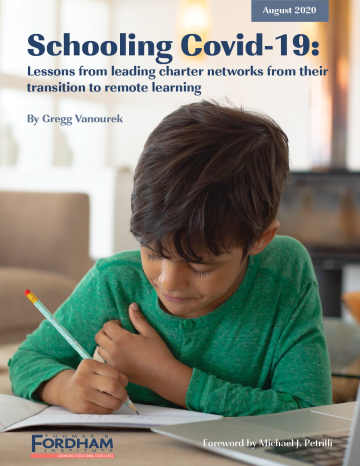
Schooling Covid-19: Lessons from leading charter networks from their transition to remote learning
Last spring, the Covid-19 pandemic upended routines for over 56 million students and challenged more than 3.7 million teachers in over 130,000 schools nationwide to continue educating kids in an online format. This transition to “virtual learning” was understandably trying for all educators, schools, and districts, but some managed to do far better than others.
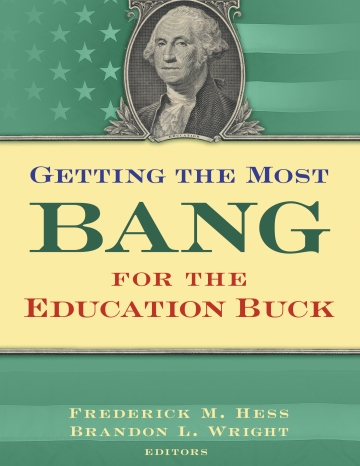
Getting the Most Bang for the Education Buck
We spend too much time talking about how much to spend on schools but not enough on how those dollars are spent. Covid-19 has made this situation worse, as schools confront massive, looming budget shortfalls and the challenges of remote learning and public health. That’s on top of familiar issues like pensions, special education, technology, and all the rest. This book offers a workable path through this maze.
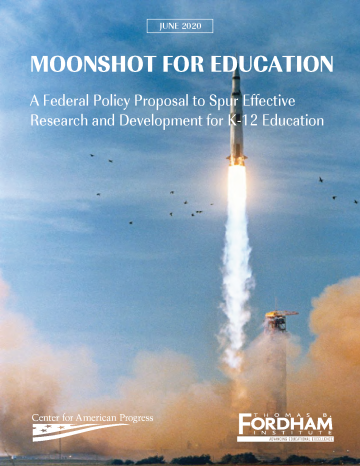
Moonshot for Education: A Federal Policy Proposal to Spur Effective Research and Development for K-12 Education
In dozens of fields, federally-supported research and development translates into new ideas, technologies, and actions. Why not in education, particularly as the Covid-19 crisis makes it abundantly clear that our educational systems are severely lacking innovative technologies that could have improved the resiliency and flexibility of our classrooms and facilitated a nationwide shift to remote instruction?
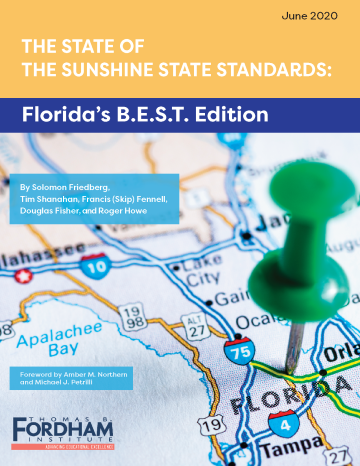
The State of the Sunshine State's Standards: The Florida B.E.S.T. Edition
A decade ago, states across the nation adopted the Common Core State Standards (CCSS) in an effort to raise the academic bar for their students. This has provoked countless political battles since then—including an especially intense one in Florida.